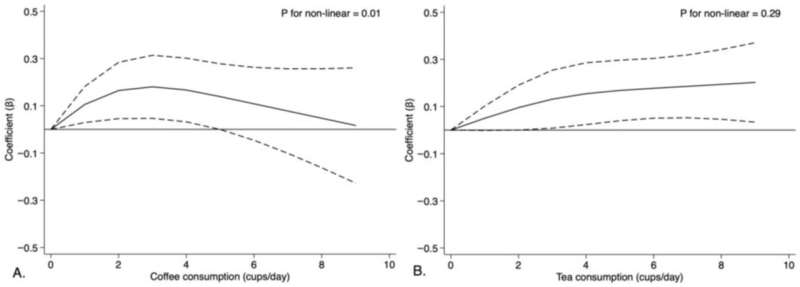Study links drinking coffee and tea to increased macular retinal nerve fiber layer thickness |
您所在的位置:网站首页 › tea coffee › Study links drinking coffee and tea to increased macular retinal nerve fiber layer thickness |
Study links drinking coffee and tea to increased macular retinal nerve fiber layer thickness
 Credit: Pixabay/CC0 Public Domain
Credit: Pixabay/CC0 Public Domain
The next time you're sipping your favorite hot beverage, consider what it might be doing for the long-term health of your brain.
New research led by Dr. Lisa Zhuoting Zhu, Principal Investigator of CERA's Ophthalmic Epidemiology team, has found a positive link between coffee and tea consumption and the thickness of our macular retinal nerve fiber layer. The macula is the central part of the retina at the back of the eye that gives us sharp central vision. The retinal nerve fiber layer is a thin layer of nerve cells that transmit visual information from the eye to the brain. "Our findings indicate if we consume two to three cups of coffee or more than four cups of tea per day, the macular thickness will increase," says Dr. Zhu. As she explains, the study used the macular retinal nerve fiber layer thickness as a measure of the brain's health: "The thinner the layer, the higher risk of neurodegeneration." Recently published in Nutrients, the study was led by Dr. Zhu and Professor Mingguang He in a collaboration with the State Key Laboratory of Ophthalmology in China. Coffee or tea?Dr. Zhu explains the study was inspired by existing evidence that tea or coffee may have protective effects for the brain. "Many cultures drink coffee and tea almost every day鈥攆rom one to more than five cups鈥攕o it's important to know the potential benefits or risks for our health," she says. In the touchscreen questionnaire, more than 35,000 participants from the UK Biobank study were asked how many cups of coffee and tea were consumed daily on average over the last year.  Restricted cubic spline models for the association between coffee and tea consumption with the average thickness of macular retinal nerve fiber layer. Adjusted for age at baseline, sex, assessment center, average total household income before tax, Townsend deprivation index, smoking statue, drinking statue, ethnic background, education achievement, body mass index, moderate to vigorous physical activity time, sleep duration, diabetes, cardiovascular diseases, hypertension, healthy diet, habitual intake of sweeten beverages or foods, serum high density liptein cholesterol level, serum low density liptein cholesterol level, spherical equivalent, intraocular pressure, habitual intake of instant coffee. Both coffee consumption and tea consumption were included in the restricted cubic model. The solid line represented adjusted coefficients and the dash line represented 95% confidence intervals (95% CI). Credit: Nutrients (2023). DOI: 10.3390/nu15051196
Restricted cubic spline models for the association between coffee and tea consumption with the average thickness of macular retinal nerve fiber layer. Adjusted for age at baseline, sex, assessment center, average total household income before tax, Townsend deprivation index, smoking statue, drinking statue, ethnic background, education achievement, body mass index, moderate to vigorous physical activity time, sleep duration, diabetes, cardiovascular diseases, hypertension, healthy diet, habitual intake of sweeten beverages or foods, serum high density liptein cholesterol level, serum low density liptein cholesterol level, spherical equivalent, intraocular pressure, habitual intake of instant coffee. Both coffee consumption and tea consumption were included in the restricted cubic model. The solid line represented adjusted coefficients and the dash line represented 95% confidence intervals (95% CI). Credit: Nutrients (2023). DOI: 10.3390/nu15051196
Groups were divided into four categories: from zero cups to more than four cups per day. Their macular retinal nerve fiber layer thickness was measured by using an optical coherence tomography (OCT) scan鈥攁 non-invasive imaging method using reflected light to create pictures of the back of your eye鈥攖hat was automatically analyzed by built-in software. The results showed that coffee drinkers had a significant increase in macular retinal nerve fiber layer thickness, especially those who drank two to three cups of coffee per day. Tea drinkers also fared well, with a significant increase macular thickness in people who drank more than four cups daily. Dr. Zhu emphasizes their study found there is a "sweet spot" for coffee consumption and having a healthy macular retinal nerve fiber layer thickness. "That means not too much and not too little鈥攁 medium amount of coffee is best," she says. However, as Dr. Zhu explains, not all coffees are created equal. "Many studies have indicated that instant coffee could be a risk factor for many health outcomes, including neurodegenerative diseases, which we also found in our study. "That suggests it's better to have good quality coffee." While the potential implications of the research are exciting, Dr. Zhu says further studies are needed to verify their findings. More information: Yixiong Yuan et al, Consumption of Coffee and Tea Is Associated with Macular Retinal Nerve Fiber Layer Thickness: Results from the UK Biobank, Nutrients (2023). DOI: 10.3390/nu15051196 Journal information: Nutrients Provided by Centre for Eye Research Australia Citation: Study links drinking coffee and tea to increased macular retinal nerve fiber layer thickness (2023, May 4) retrieved 5 May 2023 from https://medicalxpress.com/news/2023-05-links-coffee-tea-macular-retinal.html This document is subject to copyright. Apart from any fair dealing for the purpose of private study or research, no part may be reproduced without the written permission. The content is provided for information purposes only. |
【本文地址】
今日新闻 |
推荐新闻 |